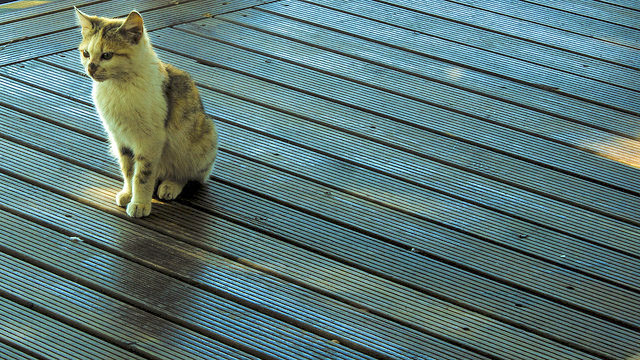
“Is this it? This is all your furniture? Not even a TV?”
This was the reaction of a good friend as he gazed around my new apartment.
“Yes! This is it,” I replied with a smile. “I’ve given up stuff.”
Since I committed to being a minimalist three years ago, my apartment doesn’t have a lot of stuff. I used to have a lot of furniture, pictures, clothes, jewelry, purses, blankets, books, vases, and random knickknacks.
I was the girl who browsed thrift shops for antiques and vintage goodies I could dust off and display. Vintage metal lunchboxes were my favorite.
Then I noticed something: the more cluttered my space, the more bogged down my mind felt, which led to moodiness and agitation. I noticed that when I cleaned my apartment and donated or tossed away things I didn’t need, my mind felt clean and clear. I was more calm and focused.
It was as if superfluous, useless thoughts peacefully slipped out of my brain with each random trinket I donated or trashed. I don’t understand the science, but the collection of useless stuff in my apartment became a metaphor for my mind.
To me, minimalism is detoxing my space. It’s about getting rid of a bunch of junk and having only what I need. It’s actively choosing the unembellished life over a life cluttered with material things. This has allowed me to experience and internalize the joy of simplicity.
I learned fast that real happiness doesn’t come from owning a lot of stuff and never will. In fact, the race to always having “the next best thing” usually leads to chronic stress, unhappiness, and feelings of inadequacy. It’s a race you can’t win. The irony is that by choosing less, I have more: greater fulfillment, more appreciation and bigger life satisfaction. Minimalism has benefited not only my mood, but also my bank account, quality of relationships, and even my waistline.
By decluttering my apartment, my mind automatically felt clearer and lighter. The emptiness was freeing and a visible reminder that I wasn’t attached to any one place or anchored by meaningless possessions. I’m prone to depression. Everything, from my scalp to the arteries in my feet feels heavy in the throes of a depressive episode. Minimalism is external lightness that helps balance the internal heaviness. Through minimalism, I’ve learned that my mind mimics my environment. If I don’t like my environment, I need to change it or switch to a new one before my mind copies it.
I spend a lot less money since becoming a minimalist. The bandwagon of conspicuous consumption is tempting, especially when immersed in social media—an inescapable sea of embellished photos of what people have and look like. The problem is that the high with new things is fleeting, and you end up spending more to achieve the same high. Now, not only do I save more money, but my closets and drawers are a lot neater and easier to organize. I can actually find the thing I want to wear in seconds rather than minutes.
Minimalism has improved the quality of my relationships. With the rise of social networking and dating apps, we’ve morphed into a species that swipes. The species that swipes doesn’t appreciate the person in front of it and is always looking for the next best thing. This is a fool’s folly, because the “next best thing” is a delusion. Minimalism has taught me to stop, or at least slow down, on swiping and really get to know and value the person in front of me. I’ve had richer conversations and made more intimate connections. These things help ward off depression, maybe more than anything.
My waistline is fitter because of minimalism. I used to shop for food like I was preparing for a “first class” Armageddon, meaning if I was going to succumb to zombies, I wanted to go out eating my favorite sweets. I wouldn’t buy canned beans and bottled water. Instead, my cupboards and refrigerator were jam-packed with chocolates, baked goods, and high caloric snacks. The problem is that there were never any zombies, but I’d eat the food anyway. My waistline would pay the price.
Other times, my edible purchases were poached by opportunistic bacteria, and I’d have to toss them. I sometimes wonder how much money I wasted on bacterial decay. Now I only buy enough food for the upcoming week, which has benefited both my bank account and my waistline. I’m more fit, so if there are zombies, I’ll at least be able to run faster. Plus, there’s no arguing that many of us humans get a rush of satisfaction when we drop a few pounds. Call me superficial, but I’m no exception: I look fitter so I feel better.
Minimalism is about quality over quantity, which helps cultivate appreciation for the important things in life. It’s about simplifying your space, pantry, closet, social life. and ultimately your mind. In that sense it can help one live more efficiently, intimately, healthily, and peacefully.
Minimalism is the opposite of gluttony and greed, two traits that never lead anywhere good or healthy. It can help you cherish the moment, which these days is an endangered art. We are constantly bombarded with advertisements that tell us we need a lot of things; that we can’t live without them. Those are lies, and minimalism will help you realize that a happy, thrifty existence is not only possible but more rewarding and significantly more fulfilling.
While it’s human to want to “keep up with the Joneses,” remind yourself that the Joneses probably weren’t that happy and always stressed.
~
~
~
Author: Dr. Erin Stair
Image: Flickr/Oguzhan Cevik
Editor: Travis May
Copy & Social Editor: Lieselle Davidson








Read 0 comments and reply